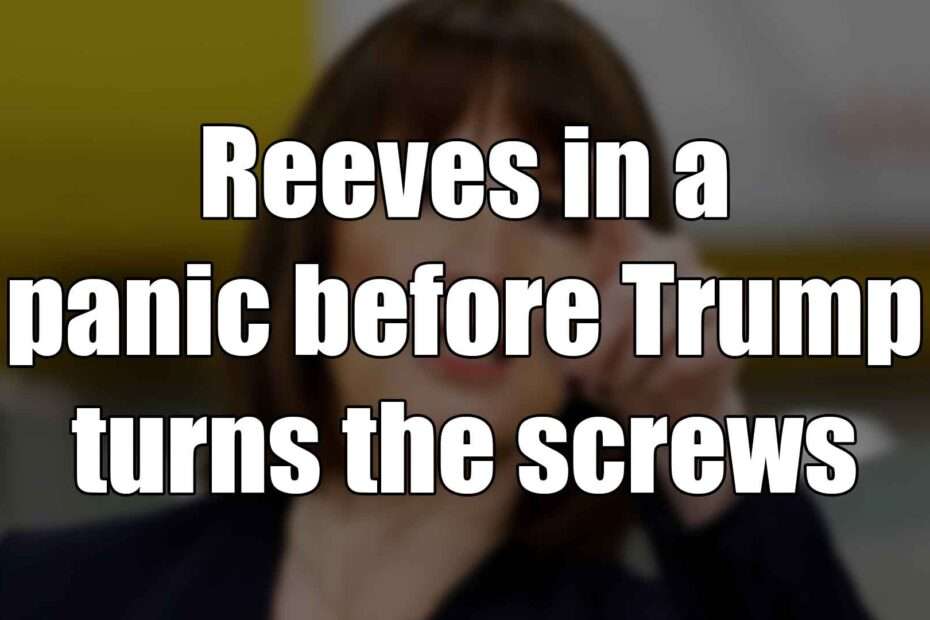Reeves in a panic before Trump turns the screws
Reeves Poised to Scrutinise £700m Tech Levy Amidst Escalating Global Trade Tensions
Chancellor Rachel Reeves is preparing to conduct a comprehensive review of the digital services tax (DST), a £700 million levy targeting American technological behemoths, as the spectre of an intensifying global trade conflict looms large on the horizon.
The impending reassessment comes at a particularly delicate moment in international economic relations, with significant diplomatic and financial implications for the United Kingdom’s trading relationships, particularly with the United States under the potential return of Donald Trump to the presidency.
The digital services tax, initially introduced in April 2020, currently imposes a 2% charge on the UK turnover of major technological corporations, generating approximately £678 million in Treasury revenues. This fiscal mechanism has become a potential flashpoint in international trade negotiations, with the United States expressing considerable reservations about its implementation.
Mounting Diplomatic Pressures
The Chancellor finds herself navigating a complex geopolitical landscape, facing intense pressure from multiple quarters. The White House is expected to exert substantial diplomatic pressure, with technology giants such as Apple, Amazon, and Google watching the review with keen interest. Simultaneously, the potential for retaliatory trade measures adds another layer of complexity to the strategic considerations.
Donald Trump’s approach to international trade has been characterised by aggressive protectionist policies, with existing tariffs already imposed on several nations including Canada and China. His statements suggesting that duties on European Union imports are “definitely” forthcoming have further heightened tensions.
Interestingly, Trump has simultaneously signalled a potential willingness to negotiate, suggesting that a compromise might be achievable to prevent punitive tariffs against the United Kingdom. This nuanced approach indicates the intricate diplomatic dance that lies ahead for British policymakers.
Experts in international trade and taxation are closely monitoring the situation. John Denton, secretary general of the International Chamber of Commerce, has noted significant potential for diplomatic pressure, stating: “I think there will be a lot of pressure put on the UK on this particular issue.”
The crux of Washington’s criticism centres on the perception that the digital services tax disproportionately targets American businesses, given their dominant position in the global technological ecosystem. Marco Forgione from the Institute of Export and International Trade articulated this sentiment succinctly, highlighting Trump’s desire to create the most favourable low-tax environment for US-based technological enterprises.
Political Positioning and Strategic Considerations
Prime Minister Sir Keir Starmer has adopted a conciliatory tone, emphasising the importance of maintaining “open and strong trading relations” with the United States. His diplomatic approach seeks to mitigate potential confrontational dynamics while preserving the UK’s strategic interests.
The tax was originally conceived as a temporary measure, intended to be replaced by comprehensive OECD tax reforms. However, these plans have been substantially complicated by the United States’ effective withdrawal from the global corporate tax agreement under Trump’s previous administration.
Treasury Calculations and Strategic Implications
While the £678 million generated by the digital services tax represents a notable revenue stream, financial experts suggest the Treasury could potentially forego this sum to maintain crucial transatlantic relations. David Henig of the UK Trade Policy Project indicates that the government is meticulously examining potential concessions.
Beyond the digital services tax, another point of potential contention is the Online Safety Act, which has raised significant concerns within the Trump administration and among US legislators. A source close to the administration described the act as universally unpopular among Republican senators and congressmen.
Market Reactions and Economic Implications
The mere anticipation of potential trade tensions has already triggered market volatility. The FTSE 100 experienced a 1% decline, while currency traders adjusted their positions, with the pound experiencing a 0.88% appreciation against the euro, reflecting cautious optimism about the UK’s potential to navigate these complex diplomatic waters.
A Treasury spokesperson has maintained a measured stance, emphasising that the 2025 review of the digital services tax was always planned, rejecting any implications of predetermined intentions regarding the levy’s future.
The unfolding scenario represents a delicate balancing act for the UK government: maintaining fiscal innovation, protecting domestic economic interests, and preserving critical international relationships in an increasingly complex global economic landscape.
As the review approaches, all eyes will be on Chancellor Rachel Reeves and her strategic approach to this multifaceted challenge, with potential ramifications for the UK’s international trade relationships and technological taxation policies.

